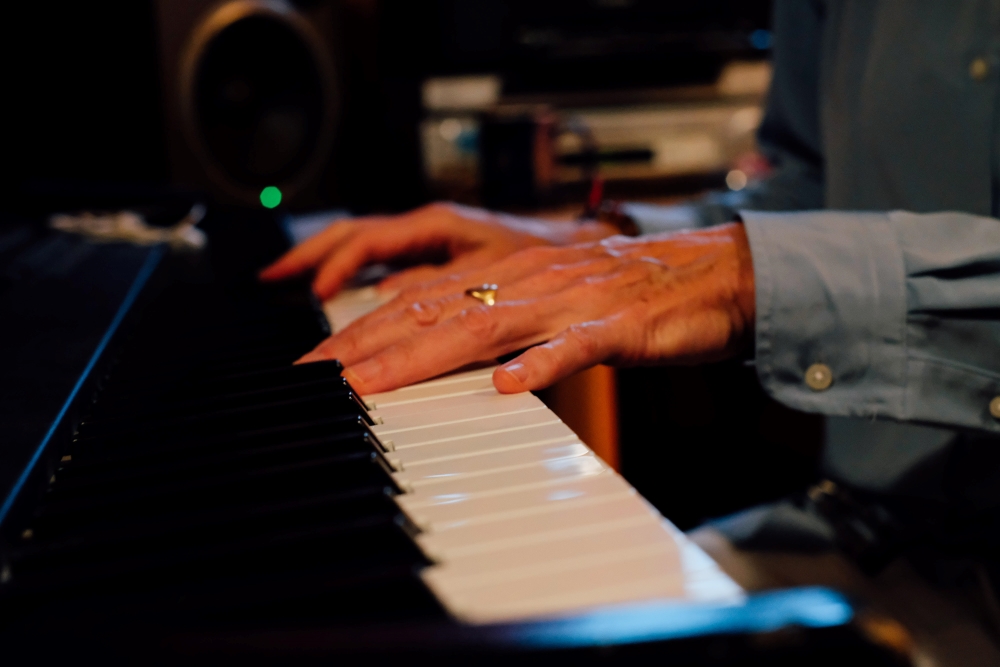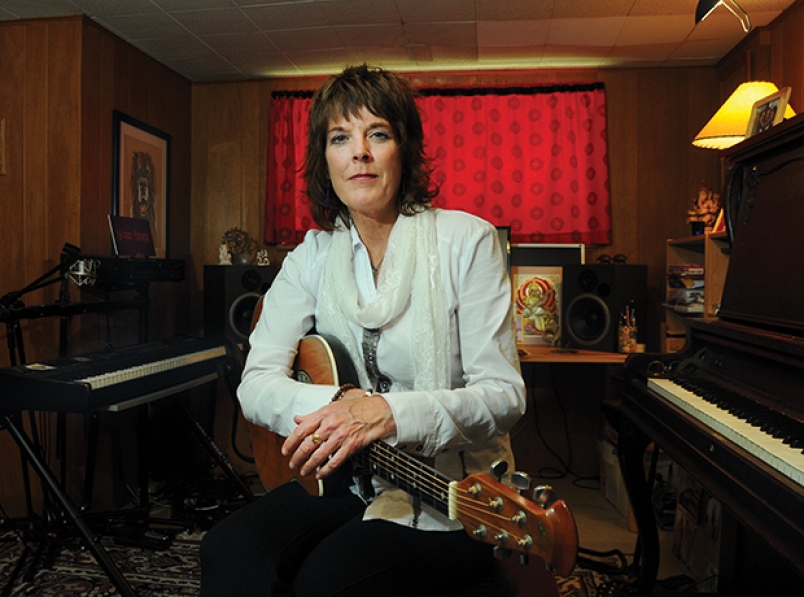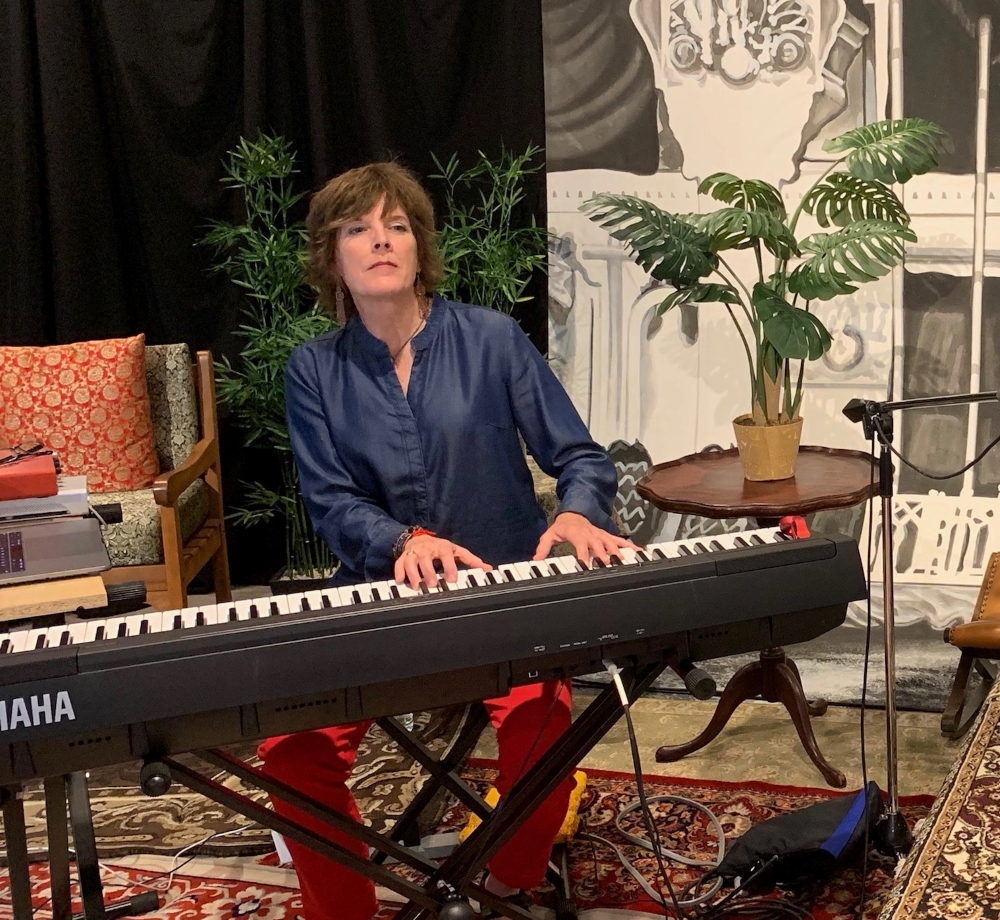31 Jan The Power of Music: with Anne Leader
We caught up with composer, Anne Leader, to hear about her career in music, key influences & the composition process.
The Interview
Melodie: Hey Anne! Thanks for taking the time to chat with us. What have you been working on lately?
Anne Leader: Thanks for inviting me into this conversation! My most recent gig was writing and producing music for a classical East Indian singer. I love the genre because it blows past my western knowledge of tonality and rhythmic possibilities and stretches me tremendously. The beauty of Indian music is mesmerizing. As well, I’m coming full circle and enjoying hunkering down at my piano exploring new possibilities with this gorgeous instrument. We’re old familiar friends.

Very interesting, I’d love to hear that piece! Tell me more, how did you first get started in music?
My home was constantly ringing with the music my parents and brothers were listening to, everything from jazz to Dixieland to orchestral. My grandmother was an exceptional piano player, and she graced us with her brilliant playing every time she visited. Following in my musical brother’s footsteps, I started classical piano lessons at age 5 and knew early on that music would be the focus of my life. In elementary and high school, I was very fortunate to have great music teachers whose endless dedication provided students with the opportunity to sing in the choir, play in stage band, orchestra and pit orchestras for musicals. The quality and scope of the training were amazing!
One stand-out memory is when the entire stage band piled into my music teacher’s Chrysler and drove to play at the high school football game at the stadium downtown. Bodies and instruments were spilling out the windows and we loved every minute of it! I particularly loved playing woodwinds in pit orchestras and continued playing in community theatre groups for many years. After the musical theatre, I discovered the primal joy of playing rock and roll, and that solidified my focus for the next couple of decades.
What a great story. What was the first album you bought?
My family had an extensive album collection that kept me satiated for some time. When it was time to chart my own musical course, the first album I bought was Aja by Steely Dan. Heart’s fourth album, Dog and Butterfly, was next, followed quickly by the band’s first three albums. When I went to college, the bus ride was 90 minutes each way, just right for listening to two albums one way, and two albums back. I wore out the Heart tapes, followed closely by Supertramp’s Even In The Quietest Moments and Yellow Brick Road.

Fantastic choices there! When did you first start writing music for picture?
I started writing music for television in my 30s as I wanted to stretch beyond the rock environment I had been immersed in for many years. I loved the variety of styles used in film music and the power that music had to influence a scene and an audience. After spending time in India, I was powerfully drawn to world music, and the expansive palette of scoring for film provided space to explore it.
I loved the variety of styles used in film music and the power that music had to influence a scene and an audience.
Music is such a powerful medium to add engagement and depth into TV scenes, to invoke emotions in the audience.
You entered the world of TV and scored award-winning films broadcast by networks such as Global, APTN, CBC, CTV, Knowledge Network, and Slice. Could you tell us a bit more about your experience? Any interesting pieces of work/stories that you can share with us?
I’ve had the good fortune to meet incredible people, like the outstanding team at Melodie, and learn about fascinating subjects, particularly through work on documentaries. Through scoring the documentary “Radical Attitudes, The Architecture of Douglas Cardinal“, I learned about this amazing man who had a strong impact on the Canadian architectural landscape. The Genie award-winning documentary “Peace Warrior” was about the heroic journey of Canadian soldier Trevor Greene as he fought to recover from a traumatic brain injury sustained during the Afghan war.
Wow, I love how you got to work on so many interesting pieces of work, it must be so rewarding. Favourite thing about being a composer?
The opportunity to express through music, and to put something beautiful out into the world is a treasured gift. The variety of musical styles and genres is an endless source of creative exploration, which I find tremendously engaging. It feels so purposeful to write and produce music. It feels like I’m doing the work I was put on earth at this time to do.
Your passion for music shines through your words. What’s been the highlight of your experience in the music industry so far?
Being invited to write music for a film that was shown at a fund-raiser event for a hospital hearing clinic. I am acutely aware of the value of being able to hear. It was an honour to contribute music for a project that would support specialists in having more resources to treat patients with hearing issues.

I love that, it’s a noble cause. Could you take us through your writing process?
Melodies are always floating around in my head, and melody usually launches my creative process. The project’s parameters and vibe dictate the style and overall instrumentation. The piano is my go-to instrument where a lot of ideas get worked out. When I need rhythms, the Logic drummer is a terrific start for driving a beat forward. I find composition to be an organic process and often seems without direction at first. Gradually a workable gem arises out of that exploration, and the process of moulding random musical shapes into the finished piece takes over.
What are your production values when deciding the music you’ve composed is ready to go?
The music continues to be reworked until I experience the emotional response the track is required to convey. When it lands and triggers emotion, I trust that feeling and know that it’s complete. The icing is going through each track meticulously to comb out any blips that got by me in the creation stage.
Which DAW do you use?
I work with Logic Pro X because it’s so navigable for both midi and audio. My composer friends also use Logic, and working with the same software allows us to exchange ideas and tips. The generous wisdom of my contemporaries has been invaluable.
And what keeps you busy outside of music?
I love to get out into nature and hike up mountain trails and along beaches taking photographs. There is so much natural beauty where I live, and it’s an endless source of wonder. I love being on two wheels, and in the warmer months take my 400cc scooter out for blissful highway rides.
A big part of my life is supporting kids who want to learn about music. It’s immensely rewarding to be present in that magical moment when a kid lights up because they’ve just played a song for the first time and realize they can actually do it! I had great teachers who inspired me, and it’s important to extend that to the next generation, especially when cutbacks are taking resources away from school music programs.
Favourite band/artist and why?
Hmm… there are so many. Seeing Heart live in 1978 was life-changing, so The Wilson Sisters will always have a special place in my heart. Elton John, Supertramp, Rush, and Kansas have all left their mark on me, as have Beethoven and Tchaikovsky. My current favourite artist is Jacob Collier. He is a once-in-a-generation artist whose creativity and ability is pushing the boundaries of music in wonderful new ways. I’m excited to follow him!
Favourite track of yours in the Melodie library and why?
Crystalline Complexities is a track with seemingly disparate sounds and instruments coming together to create a unique and interesting piece. It’s like a perfect musical mirror that reflects whatever my state is. For pure enjoyment, The Beloved takes the cake. It’s a piece I love to listen to and one I always play when I go to the piano to chill and be with the beauty of music. The Beloved always makes me thankful that I learned to play the piano, which was the doorway into the incredibly creative world of music composition.
They are both beautiful pieces of work. Thanks for your time Anne 🙂


